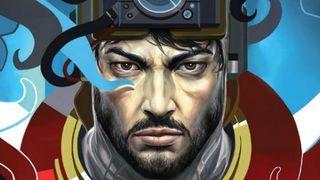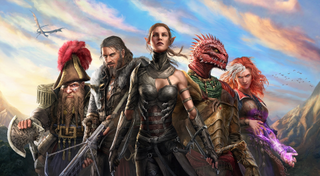Singleplayer games aren't dead, they're just changing
Ignore the extreme end of games-as-service design and solo experiences are thriving.

It’s been a long time since you could judge the quality of a game on the size of its budget—particularly in PC gaming, where the democratisation of tools and resources mean that better results are more available to more developers. Yet the notion persists that the advancement of games as a medium is inherently technological, that better technology leads to better experiences, and that better games means bigger budgets.
This is the legacy of an arms race that—truth be told—was already becoming irrelevant a decade ago. Once, you’d say that studios like id, Ion Storm, Epic and Valve held the future in their hands because the future looked like a better FPS engine. That hasn’t been the case for a very long time.
Even so, there’s a temptation to look to the most expensively-wrought games for leadership—for a sense of what can be achieved with the vast resources wielded by the biggest publishers. Disappointment necessarily follows when those publishers aren’t investing in traditional experiences like singleplayer campaigns, because these are how the forward march of progress was traditionally judged. 'Triple-A' game development took a step sideways when it became about the curation of better and more effective services, leaving players frustrated that the aspirations of the developers wielding the biggest budgets no longer aligned with their own.

The business of games has a tendency to dominate the conversation, with outrage outpacing curiosity when it comes to assessing the actions of the largest publishers.
That frustration takes the form of blanket statements—‘singleplayer games are dead’—that aren’t true in any measurable sense but importantly feel true to the people who think them or type them into comments boxes. The business of games has a tendency to dominate the conversation, with outrage outpacing curiosity when it comes to assessing the actions of the largest publishers. EA did, for example, respond to complaints about the absence of singleplayer from their Battlefront reboot by ensuring that it was present in the sequel: but that point has become a footnote in Battlefront 2’s public record, dominated as it is by microtransaction grief and 11th hour interventions by concerned Disney execs.
I don’t think players are at fault for being distracted by the business of games. In fact, I think it’s a reflection of the way that the attention of big publishers has shifted. The games-as-service gold rush has dominated the thinking of the biggest studios for years. These are companies that, in most cases, have shareholders to appease—and suddenly one day this industry of one-off $60 purchases gained the potential to yield millions more in microtransactions and season passes. Of course they went for it. Of course these were the kinds of conversations that were happening in publisher offices throughout triple-A development; it was where the money was.
It follows that the conversation around games would follow suit, that it would become concerned not with how something is designed or what it looks like but what it costs, how much it asks of you and how frequently. Spare a thought for the developers who work as part of this apparatus—the artists and programmers and designers who pour years of work into experiences that are ultimately undermined by the profit-boosting scaffold that gets thrown up around them. Another good example of this in 2017 was Shadow of War: an ambitious sequel and follow-up to a true surprise hit hamstrung by the inappropriate insertion of modern monetisation.

Of course, not all triple-A games are like this. A distinction is forming in the upper echelons of game development between ‘big business’ games and ‘big budget’ games—of course the former often implies the latter, but a gulf is forming between the proposition made by a company like Activision or EA and that of a publisher like, say, Bethesda. Games like FIFA, Call of Duty, Battlefield and most recently Battlefront 2 represent the speartip of triple-A-as-service design, studios bent to the dual purpose of creating more compelling things for players to do and more compelling things for them to buy.
Then alongside this you have publishers like Bethesda, who must certainly be counted among the ranks of ‘triple-A’ publishers but whose resources have consistently been invested differently. Dishonored, Prey, Doom, and Wolfenstein are evidence that there’s still interest in big budget singleplayer experiences. It’s telling that all of these games all throw back in some way to a previous conception of what ‘big budget’ meant—that they all gesture at the future with at least one foot planted squarely in nostalgia.
To me, this suggests that the landscape of game development as we used to understand it hasn’t actually changed all that much. Instead, a stratification has occurred in triple-A between games-as-services and games-as-products: skim off that top layer, with all of its microtransaction controversies and loot crate gambling, and you're left with a picture of a medium that is looking increasingly hale.

A healthy middle tier of studios and publishers has emerged—companies like Larian who are making the year's best games on a more modest budget.
Developers are still making, and profiting from, singleplayer games made with substantial resources. A healthy middle tier of studios and publishers has emerged—companies like Larian who are making the year's best games on a more modest budget. Lavishly-produced singleplayer experiences like Hellblade, What Remains of Edith Finch and Tacoma attest to the talent of independent developers and the quality of the tools available to them. We have seen the striking return of the traditional CRPG and the steady emergence of new experiences.
As far as PC games go, in fact, it's only that noisy end of triple-A that reliably disturbs this picture of an industry that is providing more (and better) traditional singleplayer experiences than it ever has. Equally, it's this extreme that bears the most risk. When legislation or simply changing public attitudes move against games-as-service design—which they have begun to do this year—then games whose design has been led by these phenomena will necessarily have to adapt or die. Or they'll find their own market and survive on their own terms: but that doesn't mean you have to invest your money in them, or even pay them any mind, as long as reliably excellent work is being done elsewhere in the industry.
The biggest gaming news, reviews and hardware deals
Keep up to date with the most important stories and the best deals, as picked by the PC Gamer team.
Joining in 2011, Chris made his start with PC Gamer turning beautiful trees into magazines, first as a writer and later as deputy editor. Once PCG's reluctant MMO champion , his discovery of Dota 2 in 2012 led him to much darker, stranger places. In 2015, Chris became the editor of PC Gamer Pro, overseeing our online coverage of competitive gaming and esports. He left in 2017, and can be now found making games and recording the Crate & Crowbar podcast.
Most Popular

